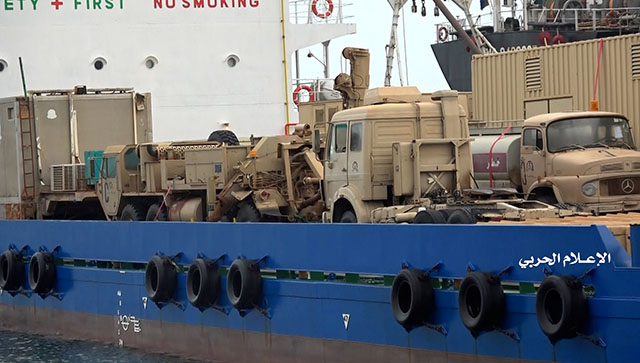Arab states find themselves on edge as the conflict in the region inches closer to their doorstep, bringing with it threats to both peace and trade. The recent seizure of the cargo ship Galaxy Leader in the Red Sea has further intensified concerns.
Galaxy Leader hijacking The Galaxy Leader, en route from Turkey to India, fell victim to hijackers in the Red Sea. Contrary to the typical image of pirates, this attack was orchestrated by the Houthi rebels, a Shia armed group embroiled in Yemen’s civil war and backed by Iran. The Houthi declaration of war on Israel last month adds a geopolitical dimension to the hijacking as they claim the ship is Israeli. “The naval forces of the Yemeni Armed Forces, with the help of Allah the Almighty, carried out a military operation in the Red Sea, resulting in the seizure of an Israeli ship and escorted it to the Yemeni coast. The Yemeni Armed Forces deal with the ship’s crew in accordance with the teachings and values of our Islamic religion,” said Houthi military spokesperson Yahya Sarea. Conflicting narratives Israeli Prime Minister Benjamin Netanyahu refutes the Houthi assertion, stating that no Israeli nationals were on board. The murky nature of global shipping further complicates matters, with the Galaxy Leader being owned by a British firm, operated by the Japanese and registered in the Bahamas. The ship’s ties to Israeli businessman Abraham Rami Ungar provide a potential motive for the Houthi targeting. Stakeholders, including Japan, expressed deep concern over the incident, recognising its potential to disrupt the critical Red Sea shipping route, responsible for over 10 per cent of global trade. As the Houthi threat to hijack more vessels looms, the international community may need to respond with measures such as escort vessels or the deployment of warships in the Red Sea. “Currently, ministries and agencies including the transport ministry and the foreign ministry are gathering information and working with the relevant countries for the early release of the vessel and its crew,” said Japanese Chief Cabinet Secretary Hirokazu Matsuno. US dilemma and Iranian proxy threat US faces a dilemma in responding to Iranian proxies like the Houthi rebels, who have targeted US assets in over 60 reported attacks since October. President Joe Biden’s limited airstrikes in eastern Syria have drawn criticism from some Pentagon officials, who argue for a more aggressive approach to counter the growing Iranian influence. Gaza conflict and diplomatic efforts Meanwhile, the conflict in Gaza continues, with Israel targeting the Al-Shifa Hospital, alleging its use as a Hamas command base. Evidence presented includes video footage of hostages brought into the hospital and the discovery of tunnels nearby. Diplomatic efforts led by Qatar and US aim to secure the release of hostages in exchange for daily pauses in the fighting, offering a glimmer of hope amid the ongoing violence. “We are hopeful that we can get a significant number of hostages freed in the coming days. I don’t want to go into the details of these talks. They are obviously very sensitive. The less we go into the details, the better the chances of such a deal. But they are very serious efforts, and I’m hopeful that we can have a deal in the coming days,” said Michael Herzog, Israeli Ambassador to US. As the Red Sea becomes a potential hotspot and tensions escalate in the Gaza conflict, diplomatic efforts are crucial to avoiding further destabilisation in the region. The outcome of talks involving Arab nations, China, Israel and Hamas with Qatar will shape the future of West Asia, highlighting the pressing need for peaceful resolutions in the face of mounting global concerns. Views expressed in the above piece are personal and solely that of the author. They do not necessarily reflect Firstpost’s views. Read all the Latest News , Trending News , Cricket News , Bollywood News , India News and Entertainment News here. Follow us on Facebook, Twitter and Instagram.


)

)
)
)
)
)
)
)
)



